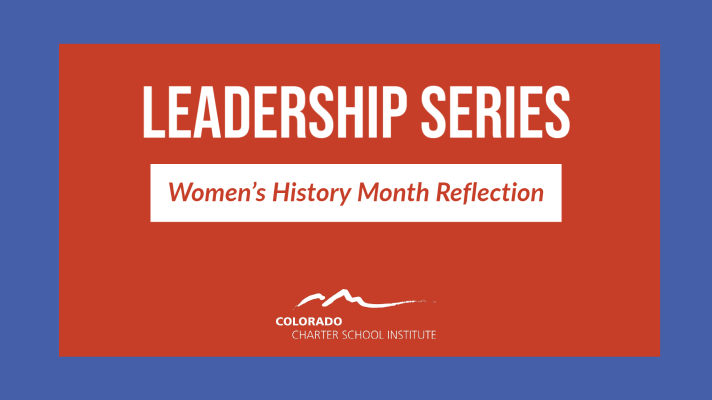I am excited to welcome CSI’s Board Chair, Jill Anschutz, as our guest blogger this month. As we celebrate Women’s History Month, it is quite fitting that we recognize the highly capable and remarkable women who serve on the CSI Board including Jill Anschutz, Danyell Lewis, Maribel Obreque, Tamara Olson, and Brenda Bautsch Dickhoner, as well as the numerous women who have served as CSI Board Members since its inception in 2004.
 By Jill Anschutz (view bio)
By Jill Anschutz (view bio)
March is Women’s History Month – a time to commemorate and encourage the study, observance and celebration of the vital role of women in American history. As the Colorado Charter School Institute, it makes sense to look more closely at the role of women in the history of education in America. Each of us can likely think of a woman who impacted our own education: a mother who advocated for a spot for you in a particular school or classroom, a teacher who helped you find your place in the awkward middle school years, or perhaps a professor who challenged your assumptions and pushed you to think more clearly.
In this post, I’m honoring three unique and influential women from different periods in American history who shaped how we think about teaching children and the ways they learn and grow.
Meet Mary McLeod Bethune (1875-1955). Born in South Carolina shortly after the end of the Civil War, Bethune became an influential black educator, civil and women’s rights advocate, and government official. She was one of seventeen children born to former slaves Samuel and Patsy McLeod and she grew up picking cotton in the fields. But Bethune benefitted from government efforts to educate African Americans after the war. She graduated in 1894 from a boarding school in North Carolina and headed off to college in Chicago. After college, she became a teacher and eventually opened a boarding school in Florida, the Daytona Beach Literary and Industrial School for Training Negro Girls. The school later became a college and issued its first degrees in 1943. In addition to Bethune’s work leading educational institutions, she was involved in voter registration drives after woman gained the vote and she was the founding president of the National Council of Negro Women. In 1936, President Franklin Roosevelt named her director of Negro Affairs of the National Youth Administration, making her the highest ranking African American woman in government. She even garnered accomplishments in business as the co-owner of a resort in Florida and the Central Life Insurance Company of Tampa.
I included Bethune in this post to honor her wide-ranging achievements and contributions that paved the way for many more women – especially African Americans – to pursue education and hold positions of leadership in higher education, government, and business. (Source)
“We have a powerful potential in our youth, and we must have the courage to change old ideas and practices so that we may direct their power toward good ends.” – Mary McLeod Bethune
Meet Madeleine L’Engle (1918-2007). Born just over 100 years ago, L’Engle became a beloved American author known for her creative spirit and unconventional approach of writing for children. Although she never held a formal role as an educator, I’m featuring her in this post for her substantial contributions to reading and literacy for children. Her most famous book, A Wrinkle in Time, is as enjoyable for adults to read as it is for kids. The novel incorporated many elements not typically seen in books for young readers at the time of its release – a female protagonist, science fiction, teenage angst, and girl power. A Wrinkle in Time went on to win the prestigious Newbery Medal (1963) and remains on many lists of top books for children and best American novels. In her long and productive life, L’Engle authored more than 60 books and transformed “the landscape of possibility for women writers of science fiction and female protagonists.” (Source)
“You have to write the book that wants to be written. And if the book will be to difficult for grown-ups, then you write it for children.” – Madeleine L’Engle
Meet Alison Gopnik. Currently a professor of psychology at the University of California at Berkeley, Gopnik gained notoriety in 2011 for a TED Talk titled “What do babies think?” Her research explores how young children come to know about the world around them. I’m honoring Gopnik here because of her research and advocacy around the idea that children are much smarter than we traditionally give them credit for. Through research, she has demonstrated that “children develop and change intuitive theories of the world in much the way that scientists do.” Her research findings are challenging long-held beliefs about the minds of young children and are starting to change how educators approach early childhood learning. Gopnik even urges adults to change our framework and enter into “baby mode” to better open up to new ideas and solutions. (Source)
“Children can teach us that if we really want to learn about the world, we need to open ourselves up to new possibilities.” – Alison Gopnik

